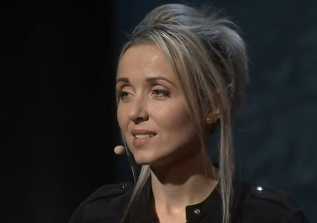(单词翻译:单击)
听力文本
I read somewhere that you should try and be the person that you needed when you were younger.
我在某处读到,你应当尝试并成为你年轻的时候需要的那个人。
And back when I was a teenager, I would have needed to know that the shame wasn't mine,
当我年少时,我本应需要知道我无需感到羞耻,
that there's hope after rape, that you can even find happiness, like I share with my husband today.
被强奸之后仍有希望,你甚至能够找到幸福,像我同我丈夫分享的一样。
Which is why I started writing feverishly upon my return from Cape Town, resulting in a book co-authored by Tom,
因此,从开普敦一回来,我开始兴奋地写作,最终形成一本和Tom共同完成的书,
that we hope can be of use to people from both ends of the perpetrator-survivor scale.
我们希望这本书无论对犯罪者还是幸存者都有帮助。
If nothing else, it's a story that we would've needed to hear when we were younger.
至少,这也是一个在我们年少时需要去了解的故事。

Given the nature of our story, I know the words that inevitably accompany it -- victim, rapist
考虑到这个故事的性质,我知道有一些词语将不可避免地伴随它--受害人,强奸犯,
and labels are a way to organize concepts, but they can also be dehumanizing in their connotations.
标签是组织概念的一种方法,但他们也可能因其内涵被非人性化。
Once someone's been deemed a victim, it's that much easier to file them away as someone damaged, dishonored, less than.
一旦某人被认定为一个受害人,他们就更加容易被归类为被伤害、遭受羞辱、低人一等的。
And likewise, once someone has been branded a rapist, it's that much easier to call him a monster -- inhuman.
同样,一旦某人被打上强奸犯的烙印,就更加容易称其为怪物--非人类。
But how will we understand what it is in human societies that produces violence if we refuse to recognize the humanity of those who commit it?
但是,如果我们拒绝去认识犯罪一方的人性之处,我们如何能够理解人类社会中究竟是什么在制造暴力?
And how -- And how can we empower survivors if we're making them feel less than?
并且,如果我们总是让幸存者觉得自己低人一等,我们又如何给予他们力量呢?
How can we discuss solutions to one of the biggest threats to the lives of women and children around the world,
我们要如何找到解决方案,面对这个全球范围内对妇女和儿童生命的最大威胁之一,
if the very words we use are part of the problem?
如果我们使用的词语就是问题的一部分?
演讲介绍
20年前,他们是一对恋人,当一切看似美好、令人艳羡时,在一次学校舞会后,他竟然强奸了她... 20年后,他们来到TED演讲台坦诚面对过去,讲述这20年来彼此走过的一段漫长的救赎之路。


